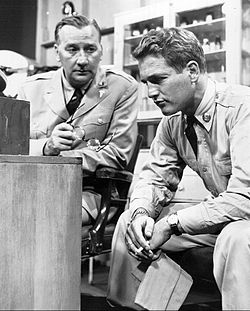| The Kaiser Aluminum Hour | |
|---|---|
 Paul Newman and Edward Andrews in "Army Game" | |
| Genre | Drama, anthology |
| Created by | Worthington Miner |
| Written by | Fielder Cook Sumner Locke Elliott Evan Hunter Loring Mandel Gene Roddenberry Rod Serling David Swift (director) Robert Dozier |
| Directed by | Paul Bogart Fielder Cook George Roy Hill Franklin J. Schaffner David Susskind |
| Country of origin | United States |
| Original language | English |
| No. of seasons | 1 |
| No. of episodes | 25 |
| Production | |
| Executive producer | Worthington Miner |
| Producers | Fielder Cook Franklin J. Schaffner George Roy Hill Jerome Hellman |
| Production companies | Unit Four, in cooperation with NBC |
| Original release | |
| Network | NBC |
| Release | July 3, 1956 – June 18, 1957 |
The Kaiser Aluminum Hour is a dramatic anthology television series which was broadcast in prime time in the United States from July 3, 1956, through June 18, 1957, by NBC. [1]
Contents
The Kaiser Aluminum Hour was shown on alternate Tuesday nights at 9:30 pm Eastern time [2] alternating with Armstrong Circle Theatre , with the first broadcast airing on July 3, 1956 and the final one on June 18, 1957. [1] As can be surmised from the title, the program was sponsored by the Kaiser Aluminum Company. [3] Unlike low-budget anthology series such as Fireside Theater , The Kaiser Aluminum Hour featured many well-known Hollywood actors of the era, including Paul Newman (who appeared in the first telecast, Army Game), Ralph Bellamy, MacDonald Carey, Hume Cronyn, Robert Culp, Kim Hunter, Forrest Tucker, Jack Warden, Natalie Wood, [4] Felicia Montealegre Bernstein, William Shatner, and Dennis Hopper.
In April 1957 NBC proposed moving the series to the 10-11 p.m. Eastern Time slot, still on alternate Tuesdays, when the current contract ended. The sponsor declined to accept the offer, leaving the program's future uncertain. [5]
The program won the Sylvania Award for New Series in 1956. [6] Steven Gethers's script "Cracker Money" won second prize in competition for the best television plays of 1957 and was included in the book Best Television Plays 1957, published by Harcourt, Brace and Company. [7]